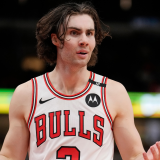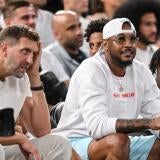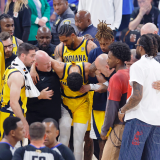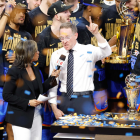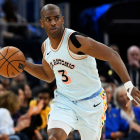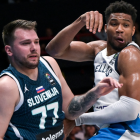
A conversation between Jonah Keri and Gail Miller: Jazz owner's move to keep team in Utah forever could work in other sports
Miller talked to Jonah about her legacy trust and a variety of other topics

SALT LAKE CITY -- Everywhere you look, you see professional sports team owners grifting the public.
The grift starts subtly enough. Hey, they say, what would you think about a shiny new stadium for our local team? Problem is, it never ends there. That initial inquiry turns into demands on taxpayers for hundreds of millions of dollars in their pockets. If those taxpayers resist, the threats of franchise relocation begin. And if the locals insist on holding their ground, the owner will pick up his toy and take it somewhere else, to a place where government can be more easily suckered into making deals against the interests of the community.
Gail Miller didn’t want that. Miller and her husband Larry bought a 50 percent share of the Jazz in 1985, then bought the rest a year later. When Larry died in 2009, Gail took over sole ownership of the team, and has now been involved for more than 30 years. But while Gail Miller’s net worth has been pegged around $1.75 billion, an underlying tension would at times defy the Jazz franchise. Would she sell the team, some wondered. And if she did, would it be to a new owner who would want to move the Jazz out of Salt Lake City, one of the smallest and most isolated markets in North American pro sports?
In January, Miller answered that question loud and clear, announcing that ownership of the team would transfer to a so-called legacy trust. The trust would be designed to keep the Jazz in Salt Lake City in perpetuity, long after Miller and her children have passed on.
Recently, I flew to Salt Lake City to talk to Miller about that trust, the history of the Jazz, the value of philanthropy, and more. You can listen to the entire conversation in its entirety on this week’s edition of The Jonah Keri Podcast. To supplement that podcast, here are a few key passages from that interview.
On extolling the virtues of small-market Salt Lake City:
“I think for Salt Lake, being a big fish in a little pond is really quite attractive because they come here thinking, ‘Oh, there’s nothing to do in Utah, we’re not going to have a good experience.’ Salt Lake is a great place to live. The people are friendly, they’re nice, it’s easy to get around, it’s beautiful, of course we have the seasons. We probably don’t have the nightlife that a big city has, but we have a nightlife for these players if they want that. They are highly regarded by the public here. These are their heroes. Because the Utah Jazz is the one part of our community that unifies everybody. We have college rivalries, we have BYU and University of Utah which is a real rivalry, and then we have Weber State and Utah State. So this area bleeds red. But the Utah Jazz unite everybody. Once you come into this arena, you’re a Jazz fan. And we like that, and we promote that.”
On the recent article by The Undefeated writer Marc Spears, arguing that Salt Lake City’s monochromatic racial makeup can make it tough to attract marquee free agents ... even though African-American players who end up on the Jazz often grow to love the city:
“I think we do our best to sell who we are. That’s where we have to start, and then show them there’s not, I think this city has a lot of diversity, it may not be in that community. There are a lot of Latinos here. But it’s much more than it used to be. When I was going to high school, I think we had one black person in our high school. It was pure white, almost. It’s not that way that much anymore. For me, I don’t see color. I have two granddaughters who are half-black, and they’re just my granddaughters. And that extends to the community, having dealt with basketball teams for 30-something years. People are people, and when you show them that they’re accepted and there are ways that they can integrate into the community, and make a difference, and have a good life here, I think those are the things people want no matter what color they are.
“So I think we appeal to that, and of course we always try to help them integrate. We have mentors that help the young players with managing money and doing things that help keep them out of trouble. That’s important for young players. So I don’t know if there’s a good answer for it, but it’s just doing everything you can to make it a comfortable place for them. Big names probably will never come here but it’s not because of the community, it’s because they don’t get the press that they would get somewhere else. They don’t get the [endorsement] contracts that they would get somewhere else. So I think those are the things that keep them from coming here, it’s not the community. It’s a great community.”
On finding other methods to retain top players once they do become members of the Jazz:
“You have to have the infrastructure that keeps them here. The technology, the playing facilities, you have to have the people that are working towards what they want and that’s a championship. We certainly want a championship. What we decided to do was kind of scrape the playing field and start young and build what we wanted, because we knew we were not going to get the high-priced players or the high-end names. So we decided to take the risk of starting over and build who we want with Quin [Snyder] and felt like he was the coach that could do that. And I think he’s done a great job in building camaraderie, and cohesiveness, and he’s done it through things like, they’re very simple, but we feed the players breakfast and lunch every day. They have a room where they can go in and be together and build that camaraderie. They like each other. And that comes from a coach who knows how to read them and how to provide for them the things that are important to them.
And then ownership which will support a coach, and the management that goes along with that. And we’re not averse to hearing what they need and saying if it makes sense, then we need it. If it’s frivolous, we don’t need it. So we’re very careful about providing what they’re asking for as long as it’s going to make the team better. I think that’s the question we ask, ‘Will that make us better?’”

On why and how the decision was made to transfer team ownership to a legacy trust (note: The Miller family will also reap tax benefits from the plan):
“To tell you the real answer, I have to go back to the beginning when we bought the team. It was 1985, we had been in business for six years. We came here in 1979, which by the way was the same year the Jazz came from New Orleans. However we were busy building our business and we didn’t go to basketball games. In 1985 they were in jeopardy of leaving the state because they were not being supported financially, we couldn’t make payroll, there were too many things to deal with and Sam Battistone who was the owner had an opportunity to sell the team and move it out of state. Larry understood how important of an asset it was to the community and at that time I think there were only 23 teams. And Utah was one of the smallest markets, and his business sense said if we ever lose this team, we’ll never get a professional sport basketball team back to Utah, because the market is too small and there are so many that want them. So Dave Checketts who was the president of the team called him one day and he said, ‘Larry, we’re looking for people to invest in the Jazz. We need to find 30 investors of $100,000 each so that we can do what we need to do to keep the team here.’ Larry listened to him and said, ‘Well, Dave I’m interested but I don’t think that’s the way to do it.’
So Dave went down to his office and talked to him, and I don’t know what they talked about because I wasn’t there, but I do know he came home and he said, “The Jazz are in jeopardy of leaving Utah. If we can do anything to keep them here, we need to do that.” The first half, one half of the Jazz was being sold for $8 million. Now, we didn’t have $8 million. We were still struggling to make our business viable, although we had bought a few other dealerships. So we talked about it and we looked at all the angles of how we could do it and he got advice from trusted advisors, and all of a sudden one day he said, ‘The Jazz just can’t leave Utah. We’ve got to do everything we can to keep them here.’
“So he found a way to borrow the money, and we kept the Jazz in Utah. Not because we loved basketball, but because of the value of the franchise to the state and to what it did for our city and state. The problem was, the next year the same thing happened. Sam was ready to sell the team again, only now it’s increased in value, and to buy the second half we had to come up with $14 million, which we again didn’t have. But Larry was very creative, and he had ways, he had things he could put together, and somehow miraculously he did that again. So we became sole owners of the Jazz. We then of course began when we bought it, the first half, we started coming to games, you don’t have an investment like that and not support it. So we became Jazz fans and it was because we knew the value of what it meant to the community, not because we needed or wanted the money.
“So when we talk about putting it in a legacy trust, now our kids grew up with the Jazz. They knew what it meant to us. They knew what it meant to the community. And they knew how valuable it was to keep it here. But they also knew they were never going to recognize any monetary value from it. And I don’t need it. I want to honor Larry’s legacy as far as what he wanted. And the question has lingered all these years, ‘When are you going to sell the Jazz?’ People cannot believe that you can have an asset worth that much money and not be tempted to sell it and take the money and use it for something else. And I could, I could get totally out of debt in all my other businesses.
“It’s crazy. It’s crazy what they’re worth now. It’s crazy what players are paid. There are figures, there have been studies done as to what this asset means to the community, as far as the infrastructure and the money that it creates. I wish that I could remember the figures but it seems like it’s $14 billion a year. It’s big, it’s really big. But our family has never felt like this was a money-maker for us. As long as the Jazz makes money to run the team, that’s what we need to do. As far as selling it, there was no even talk about, “No don’t do it Mom, we need it, we want to be able to sell it.” So the idea is, I’ve been doing my estate planning, put it in a trust, put that question to bed, keep it viable for as long as we can even look out into the future. But we just felt like if we could do anything for the state we love, it’s to create a place for the Jazz to live forever, because it can do so much for our state.”
On whether this kind of trust could work in other markets:
“Oh, certainly other teams could do it. Whether they will or not is another question. I think the mindset for us is, ‘This is good for us. If other teams would do it, that’s great.’ I don’t know how many other teams are owned by one family. Many teams are owned by consortiums or big companies and they’re not, a team is a small part of their portfolio. For us, it’s the whole enchilada almost. And we really want to protect it and preserve it. So if other teams would do it, I think we’ve had a great response here.
“Our community feels like we’ve done something wonderful, which is gratifying to me that they are so pleased that we would keep the team here, and they look at it as a gift of loyalty to the community and that they can look forward now to their children enjoying the Jazz and having the experiences they’ve had. That’s very gratifying to me. And it’s much more important to me that the community feels the spirit in which we did it, rather than that we’ve got all this money tucked away. I don’t care about the money, I’ve got enough for me, and I would have enough for me if I had none. So it’s really a look at a long-term plan to do something good, to enrich lives. That sounds silly. How does sports enrich lives? I shouldn’t say that, I won’t go there, but sometimes I look at sports, I used to look at softball when Larry played softball, and think, ‘Look at all those funny men dressed in those funny uniforms running around that big field playing ball. Why are they doing that?’ And sometimes I get a glimpse of that here, but then I look at the audience and I see the joy it brings to all those people, and if that’s what it is, that’s great.”
To hear the rest of the interview with Utah Jazz owner Gail Miller, check out this week’s edition of The Jonah Keri Podcast.
![[object Object] Logo](https://sportshub.cbsistatic.com/i/2020/04/22/e9ceb731-8b3f-4c60-98fe-090ab66a2997/screen-shot-2020-04-22-at-11-04-56-am.png)


